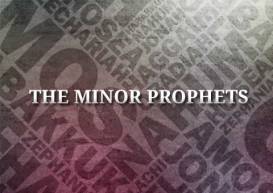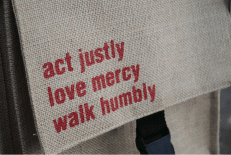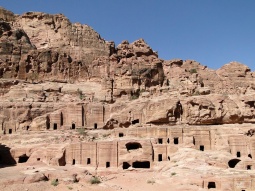 In the final sections of the Old Testament we find a collection of smaller prophetic writings (the Minor Prophets). Each Prophet speaks into a particular situation, yet all have the same message: Repent or bad things are going to happen. Each serves as a warning to God’s people of what is lying on their doorstep waiting to pounce. This message isn’t just reserved for those people back then – for Peter tells us the exact same thing in his first letter to the Christians:
In the final sections of the Old Testament we find a collection of smaller prophetic writings (the Minor Prophets). Each Prophet speaks into a particular situation, yet all have the same message: Repent or bad things are going to happen. Each serves as a warning to God’s people of what is lying on their doorstep waiting to pounce. This message isn’t just reserved for those people back then – for Peter tells us the exact same thing in his first letter to the Christians:
“Be well balanced (temperate, sober of mind), be vigilant and cautious at all times; for that enemy of yours, the devil, roams around like a lion roaring [in fierce hunger], seeking someone to seize upon and devour.” – 1 Pet 5:8 AMP
The English language of the Bible speaks of God bringing the destruction upon His own people – but here Peter tells us that it is actually the devil who is doing it. The reality is that the devil has no power beyond what God allows him to have. Sin causes God to simply withdraw His hedge of protection from off a situation – which allows the devil the freedom to come in and destroy. That is what is happening during the OT Prophetic times.
The Prophet Nahum is writing in between two major situations in the late 6th century B.C. The first is the fall of the Egyptian city Thebes to the Assyrians in 663 B.C. (If you remember – it is the Assyrians who would capture the northern kingdom of Israel about 100 years earlier). The second major event that is about to take place during Nahum’s ministry is the unimaginable fall of the Assyrian capital, Nineveh in 612 B.C. At the time Assyria was dominating the world, yet an alliance between the rising Babylonian empire and the Medes would bring an end to that dynasty in dramatic fashion. The capital city of Nineveh was a modern marvel to behold. Its mighty power extended for an entire century. Archaeological discoveries have turned up massive walls 8 miles in circumference, an elaborate water system, a huge palace, and a royal library which held more than 20,000 clay tablets!
It was to this massive, modern city that Jonah was sent by God with a message of salvation. His resistance led to a visit with Moby Dick, with his eventual obedience resulting in a revival in the city. Known as the sister book to Jonah, Nahum (about 100 years later) reveals that this revival was short-lived. Nahum wanders the streets of Jerusalem like a crazy man, prophesying the coming demise of Nineveh, that great city. (One can only imagine the awkward looks and giggles which came his way on the streets).
During about the same time, while Jeremiah, Zephaniah, and Nahum all warn Judah of the impending disaster, the prophetic book of Habbakuk joins the fray. Written as a prayer/conversation between Habbakuk and God, the prophet asks God why He (as a righteous God) is not punishing the sinful people of Judah (Hab 1:2-3). It isn’t that Habbukuk wanted the people to be destroyed, but his love for God and His Law was so strong that he began to wonder why the many warnings being proclaimed by the prophets were not coming to pass.
God’s answer to Habbakuk is that judgment will be coming through a people called the Chaldeans. These are a people group who would join forces with the Babylonians when they invade Judah in 587 B.C. God tells Habbakuk:
“For behold, I am rousing up the Chaldeans, that bitter and impetuous nation who march through the breadth of the earth to take possession of dwelling places that do not belong to them.” – Hab 1:6 AMP
Again – it isn’t God who is causing this evil, bitter nation to destroy Judah… He just isn’t stopping them this time. They are being motivated and empowered by the devil, and the people’s sin opens the door.
As we have seen many times on our journey through the Old Testament, sin brings death. Both Nahum and Habbakuk have joined a long list of prophets whom God sends to His people in a last-ditch attempt to get them to repent from their wickedness and return to the Blessing of the Lord and His protection. Their refusal to heed the warnings is what leads to their demise.
That demise is still felt today… and the warnings are still coming…
Be Fruitful & Multiply,
PK




